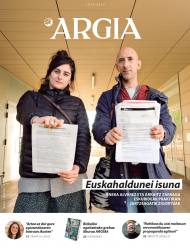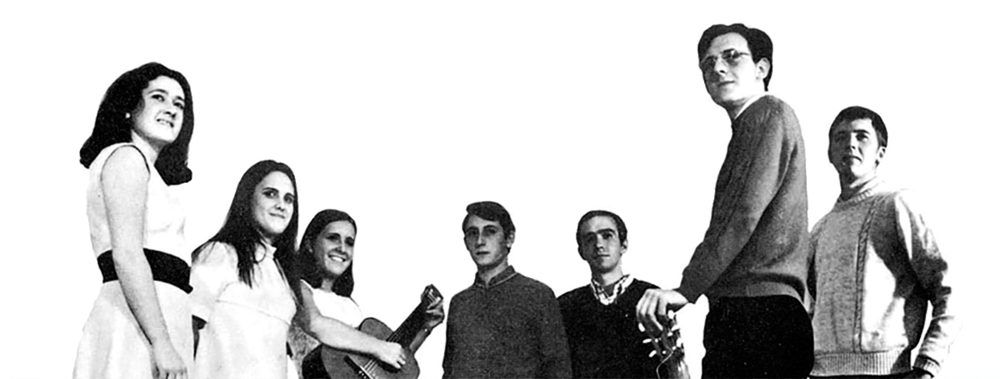"What better than singing new songs against nostalgia?"
- It has been thrown at the roots of the popular song; the experience of experimentation as crutch, the desire for the pieces to remain in the memory of the listener. He's a musician from different directions, colors, edges and instruments, but he just published a bare, raw voice-based disc. You died (Repeater).
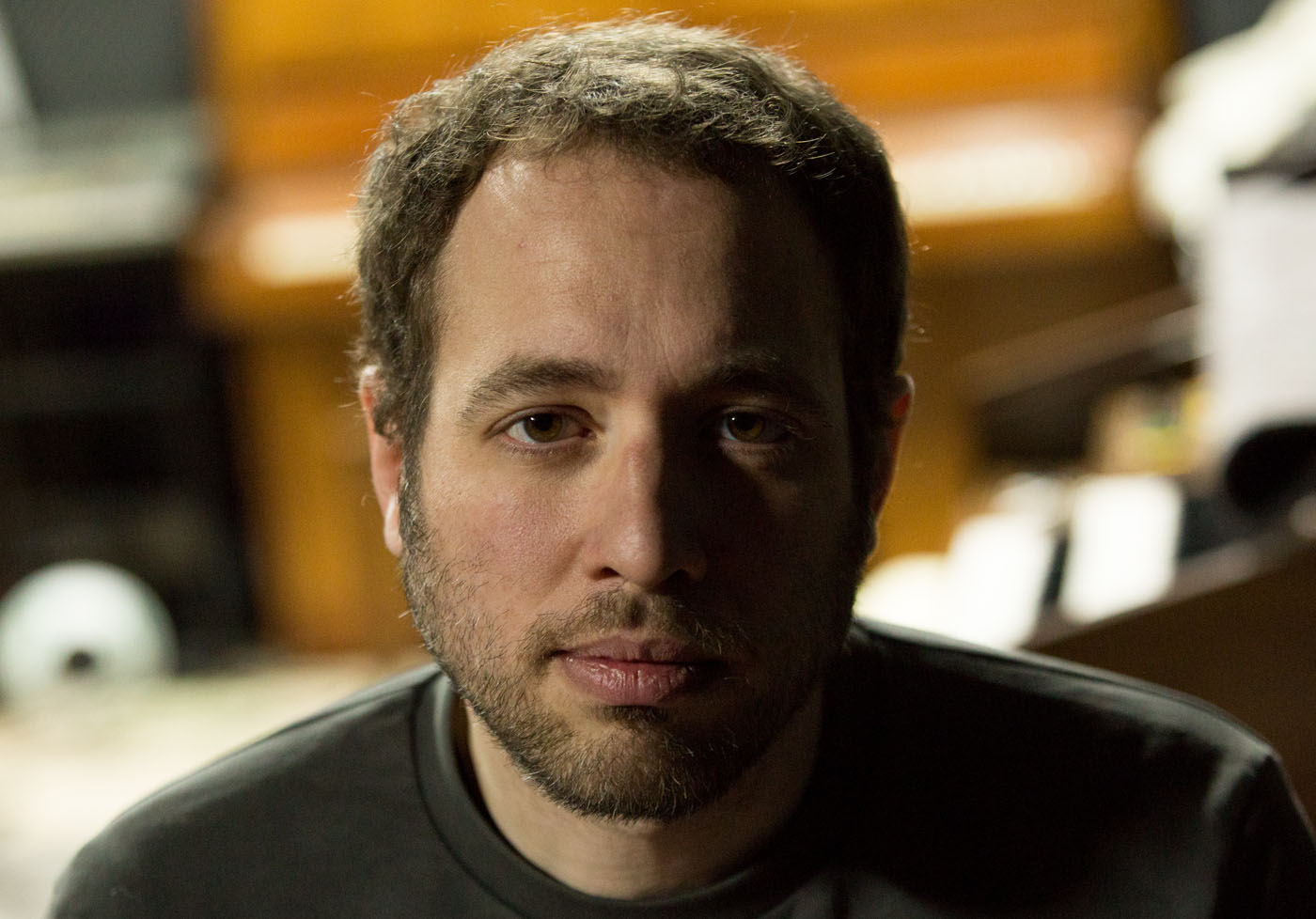
In the Bilbaíno district of Rekalde, Ibon Rodríguez (Sestao, Bizkaia, 1978) shares a test site with half a dozen friends and musicians. It consists of three pianos / organs. It wouldn't be a bad place to record some songs. The place has its habitat and is comfortable between the instruments.
The polyhedral musician has a Nordic ear, clearly oriented towards the experimental as towards popular music, and from there, and forward, towards everything. Formed in groups of txistularis and dances, he has edited four albums as conductor and member of experimental rock group Eten; he has been producer of records of Xabier Montoia and Mursego, and has worked on records and direct records of Montoia itself, as well as projects such as Borbor, Manett, Le Noise, among others. Gargargaran has worked as a couple, with vocal improvisation and experimentation as a axis. He also currently works in Urretabizkaia, with a large team of experimentation with metal wind instruments.
He has acted alone under the name of Ibon RG; he has performed and recorded songs; but this is his first solo album. Hil zara is a double disc, composed of sixteen songs and collected in a ten-inch vinyl. In the first part he has collected eight songs (recorded in out-of-study places: Two bunkers, one eremitorio and one sima). In the second, eight others (recorded at the Eibar music school), accompanied only by piano. Repedor has made the album public with the Catalan label, and many of the first concerts will offer them in the area of Catalonia. “It’s best to play without a microphone and in those natural places, but that’s hard.”
You've died in song II, which puts an end to two albums, in a row you say: “You’re nothing but this song.” Right now, are you this too, this song, this album?
No, I wouldn't say that, because I'm in more trouble. I think I'm much more than this. I prefer not to explain the words, but precisely that enumeration, and Bertsolarism “you are nothing more than this song”, I sing it to deal with the firmness that the letters can suggest, to take weight: “You’re nothing but this song,” that is, you’re nothing. The idea of Hil zara is also open; you can tell someone that you like a lot or that you hate a lot. It may have many interpretations: because it is missing or you prefer not to see it again. Maybe I’m exposing too much, and I wouldn’t want it…
You can say that you've gone to the base of a way of understanding music, that you've gone to the top, that empty, naked song.
Yeah, at the base is the song. My base has always been the form of popular songs. But I wanted to create new popular songs. It seems that popular songs haven't been created by anyone, but they've been creative. I've always loved singing popular songs, singing other people's songs; staying with friends and singing. A long time ago, we were left with three singing voices, in the bars, and without any pretension. We didn't intend to create a group. We took Zuberoa's songs and we sang; but I wanted to turn that around, create new melodies from my insight and make capella.
Back to Erro?
Yes, it's a return to the root. The most important thing that popular songs have is that they're very live and free songs, because they're not too tied at a rate, they're very vivid harmoniously, they're constantly changing. It doesn't matter to challenge, and they don't go at a very tight pace; I also wanted to go in search of that freedom when making these songs. Finally, one album comes out to capella and another to the piano. But my initial intention was to make them capella alone, and I would say that 90 percent of the songs are created for the capella, even the piano songs.
How did the piano enter?
"I don't consider myself a good singer, nor a virtuoso. The songs I love most are very punk."
As many times, chance had made him act. He had a song composed by the letters of Koldo Izagirre. I went to record that song to adapt the tone to my characteristics or. I sat down at the piano and played a couple chords, but I couldn't take them out of the song. So I start that song also to capella, and then I put the piano in. That's what allowed me to use piano in other songs. All songs could be ready to play with the piano. I didn't want to give some people that opportunity. I wanted them to stay with the capella.
Have you felt the need to go to that nudity and that base right now in your career?
I had this need for a long time, the fact is that I have executed it now. It's going to be two years since we started recording in June, but you'll also have some melodies a couple more years. They've been saved there, they've been recorded on their cell phone, etc. Some of them have been two different songs and then they have become one, just like before entering the shower I've recorded one piece, and when I get into the metro another, and then I've stitched it all in the night... Melodies have made their way over time. In my solo career, I had already worked on voice improvisation, on nudity... so before publishing this album, I went up on stage with one voice, no inkluso microphone. So, it wasn't a problem, because I've always wanted popular music.
What do you understand by popular music?
Well, when I say popular music, it's not only popular, maybe also -- but one of my goals was to be memorable, that melody would stay in memory. I often wake up with a lot of songs in my head, and that's a sign that it's memorable. I wanted to turn to popular music for the freedom it has, but not just for that idealized freedom, but for technical freedom, because it doesn't ask for extraordinary techniques or anything like that. I do not consider myself a good singer, let alone a virtuoso. The songs I love most are very punk in that sense.
For example?
Paul Dutton and his friends Four Horsemen, Henry Chopin, Meredith Monk. Especially when I heard the Dutton experiments, I understood that I also had to do something like this. That as far as experimenters are concerned, but I find any recording of popular songs like Ocora or alan Lomax inspiring.
Isn't the same popular singing a bit punk in itself?
Yes, but I think my generation (or myself) has received it in the opposite sense: that punk is what pushed you to do things, not popular music, without realizing that that had already invented that folklore. In my career in dance groups, despite having had some very good schools – I have learned an immense repertoire – I have lived a great dependency on the scenes, a little away from popular sense, choreographies prepared for the moratorium of the most skilled, closed sheet music and metronome. As I walked down the stage, I enjoyed more of that folklore, and so I learned to love until I realized it has nothing to do with that initial idea, which has to be something free and vital.
How do punk culture and popular music get married within you?
I believe that both give the keys to empowerment, and from minimalism. With little power to make high-powered accounts and making resources available to anyone.
Is work the result of the search for the voice? Understanding the voice in two senses: to the extent that the voice is a sound, and also if it is the result of your own voice…
Yeah, I've done a lot of experiments with the voice. I think without those experimentations, the songs wouldn't have gone like this. That was also interesting to me: how to get to these kinds of popular songs from experimentation. There I have had to find my voice and also technically. I haven't worked very much technically, but I've found where my comfortable voice is. Now I can give these things live, up to forty; with Eten, for example, I tear my voice a lot more. However, that comfortable location of my voice, because of the same hue in which they are all, causes problems to the disk. I've also wanted to be free, because I haven't set any limits to stubbornly repeat myself. I mean, if I liked a melody, or I think a melody works in my head, and if I have a relative of another, then I have it. The work of breaks is just the opposite.
What is the difference between Eten and this one?
The biggest difference between the two projects is not in aesthetics, in the basquero, in volume or in speed, but here I have played more to myself than in Eten. At Eten, we're going to get annoyed, we're going to feel uncomfortable. The pause exercise is that formula: doing the opposite when the song asks us something. In this sense, Eten is more cerebral than this, although it may seem the opposite. I've let my instinct work harder and I've gone to look for those melodies so I could easily remember them.
"The few popular songs that are known are overrated, and suffer from nostalgia. It happens as with everything: about five percent is known, handled and painted."
Have you noticed the need for new popular songs?
I haven’t invented anything; Zuberoa’s popular songs are the main reference, but I’ve gotten a little tired of the tendency to sing the old popular songs over and over again, to save the popular songs… There are files and they will be saved, you don’t have to renew them over and over again. There's a lot of nostalgia for that. However, I did not want to fight anything. The idea has been to add my specimens to this repertoire. In 200 years’ time I don’t know if anyone will be remembered with those songs, but there will be the songs… And those that are in 200 years’ time, for they enjoy them, as I enjoy those of 200 years ago.
Is the popular song underestimated?
The little that is known is overrated and suffered by nostalgia. It happens as with everything: about five percent is known, handled and painted. It's impossible to get to everything, OK, but how much energy is going on around that five percent?
Beyond the technical voice, has the process of this album helped you search for your own voice?
It's not my own, it's helped me search for another voice of mine. It's me, but with a different suit. The truth is that I have reached a point where I am very comfortable, I have managed to abstract more than ever live, for example. It is very different to play alone, in a couple, trio, or with the group in question. What's really different is working alone. I have control and responsibility for everything. I haven't known that until the afternoon, because ten years ago, I was only going on a stage for the first time.
Why now by name, like Ibon RG?
It's not my first solo job, because I have a lot of pieces on the Internet. There will be about forty. I have just arrived at that lyricism, but I do not know what its continuation will be. Maybe I don't make another album like that. I keep creating songs… On the other hand, there have been some very important friends on the album, whether it’s recording, doing artwork, painting… it’s a solo album, but maybe it’s the album I liked the most, because in other projects, I think I’ve taken the charge, not only in the composition work, but to send the album to the factory and for the rest of the work. And interestingly, being individual, this time I've received more support than ever before; and that's because I've been given places to record, by Ane Arana and Ima Paralux, because they've made video, and also the painting -- they've come to all the recordings, they've advised me and they've supported me. The results are thanks to them.
You created them to make the capella. Do you miss your voice?
Yes, it is. And I really like the capella records, and many of them are experimental. In my background, this kind of song has been fermenting. And now it's gone that way, without making a lot of effort.
What are those experimental discs?
For example, Paul Dutton – Oralizations –, Joan La Barbara, Alan Watts, Magdalith, Bartolomé Ferrando, Futura Poesia Sonora (collection of 7 albums! )...
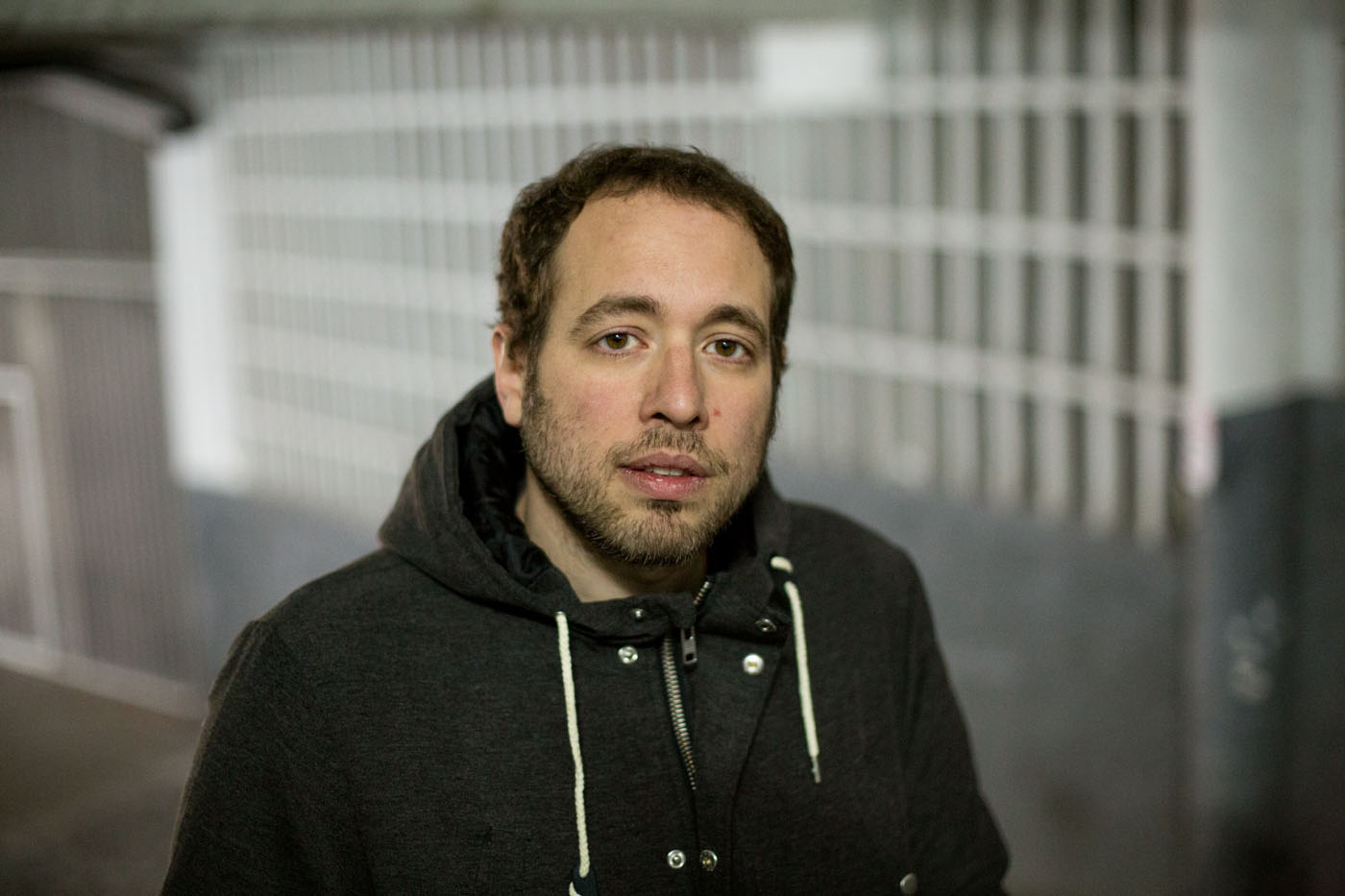
When did the popular songs of Zuberoa catch you?
They've always been there, and among friends, we've always liked to sing juerga. Singing anything, not from Zuberoa, was a pretty flawless activity all around us. We started to stay more serious, or finer, with the Eperra album of the etxartarras and Robert Larrandaburu, around 2004.
However, do we not have a kind of idealization around the “singing of the north”?
The local song has special features, some melodies go through quarter-tone and is not very common in our environment. But in addition to that, they have a wide and beautiful selection of songs, and also many of the songs that are written for the shepherds that are made every year give rank, and year after year they are adding to this repertoire, which look like popular songs from their origins. Last year in Belako Zaldüna de Jean Bordaxar there are five or six memorable songs. And what better against nostalgia than composing new issues?
It seems to me that for a lot of people, your entire musical activity is like an extreme heterodoxy that traps the edges. However, I suspect that for you it is not heterodoxy or margin, whatever a continuum, understands music as a process of path…
In all projects, I try to satisfy my ideas about music. That's all I am, it's inseparable. At every time I give more to every thing, but because I don't have time.
But always avoiding musical categorizations…
"Experimentation is posed as a word too big and has often remained as a label"
Yes, for example, the scene of experimentation in the Bilbao area is now very nice. It's very common to confuse people from different projects, and then mark it day by day. Now he is in an impasse, we are doing things at the Txaranga Urretabizkaia, I intend to give a concert with Mikel de Killerkum (guitar)… I have participated in concerts about Joxean Artze… I am open. All these events will change me, I will learn from all of them… and from there, by force, and as a consequence of this conversation, of course.
Experimentation on the one hand and popularity on the other. Can it be a difficult couple to understand for most people and be closer than you think for you?
Yes, I understand that everything comes from experimentation, from any composition, from making mistakes and correcting those mistakes… It is true that in live improvisation concerts there are no gums to erase. That's where I have to go, and a defect opens up a different path. Many times a note you don't want becomes something essential or you have to put in. You've just pissed a key wrong, and then another melody has emerged. Then it’s what’s called experimental…
What is it called?
Experimentation is often seen as too big a word. Many times it has remained like a label. I believe that experimental music is a process that will not have a concrete result. Many times I think recording an experimental disc doesn't make sense, because in itself, the experiment is important, that process, and not the result. With the end of experimentation there is a great farce, perhaps you have to change it and it is already there. Things that have to do with our lack of musical culture or with each other's musical background are often considered experimental. The first discovery for oneself doesn't mean it's experimental. The things that were done in 1960 are often called experimental. For example, I see that I am experimenting with the Txaranga Urretabizkaia; with Gargara, on the other hand, it is an improvisation.
Explain, for example, the mode of experimentation you do at the Txaranga Urretabizkaia.
"I wouldn't want to reach a lot of people at any price."
In this charanga we are ten people, and we get to exercise: let each one take breath and blow a note, and in the next breath, another other than the previous note. We'll do it all together in five minutes. Everyone following their respiratory rhythm, not the group. So, no matter what the outcome is. We’ve talked a lot about it among us: it doesn’t make much sense for us to record a Txaranga album. Because the outcome is always going to be different. On the contrary, many of the things that are considered to be primary are not experimental, as they know in advance what is to be achieved. Maybe we should invent another way of naming that music. So John Cage used the cards in his compositions, as he wanted to take his musical tastes away from the result, giving way to luck.
These experimental exercises have some obstacles to reaching the public. Or not?
It raises some conceptual problems to consider experimental music as popular. In practice too. But I don't care much, the truth. When I say these songs are popular or popular, I mean from my perspective what the popular songs are. I don't like many popular songs. I'm not saying so much the popular song in the social sense, but as a matter of memory, and understanding that for me I'm a public, a thing I'd like to hear.
Are they, however, songs to reach an audience?
Yes, I'm excited that he liked to say I don't know who. And it does more harm to me if someone tells me they didn't like it. But when we go out to the plaza, it's no longer in my hands. For me, this work is almost done, and now I'd like to enjoy it singing. I wouldn't want to reach a lot of people at any price.
"You have to create songs with no vocation to reach people, because the most effective channels to reach people are always out of music."
Can you create a popular song without a strong vocation to reach people?
This is how you have to create the songs, without that calling. The most effective means of reaching people are always out of music, that is achieved in other parameters. Sometimes there may be an exception, but that's what the market makes.
“If we were to gather some strength… we wouldn’t sell ourselves so easily,” says Indar amiñi kanta. Can that be applied to the music world as well?
No, not especially, it's more a matter of personal empowerment, of believing more in oneself. All the letters are created from repetition… The letter is always the last thing I do, and my creation is clearly in the background. For me it’s the hardest part…
Why?
This time I've had a great time, and I've been a little happy, but for me it's a hard job. It has served me to realize the weight of every word. And how you sing every word, or rather, every syllable. I've always started from phonetics, both to make these songs and with Eten. Most of the time, I write a letter when the song is rounded. You've died II can be the only exception, because it had the album more or less represented. And I wrote it knowing it was going to be to finish the record. Phonetics can bring a word and an idea. I'm starting to tarnish the song and they're showing up. The phoneme brings you to a word, and the meaning of that word can change everything, change the whole song, not only the message, but also that form. But they're just letters ...
What does “these are just letters” mean?
I try not to make the lyrics a big obstacle to the song. My work is going to that point. In order not to take away the meaning of a word, I had already done it before with the song, but it is difficult to pass the unnoticed lyrics, because everything is very naked. And that's nice too.
The letters have weight and solemnity, but more than one concrete message is full of echoes.
I see it as a problem. I mean, there's only one unwritten song on the record, but at first all the work was going there. Then you think of it as rounded with the letter, like rounded with the skin, but I, at first, never looked at it, not even as a listener. For example, I love the folklore of Albania a lot and I don't know what the hell they're saying; they want to kill the neighbor.
But his words are sound.
Yes, but they are written from an irony, because I want to mock that weight of words. The music in Eten is very cerebral and here very free, although it may seem the opposite; not in the letters, I had to take the toast more to think, because it was very important to correct with each word, with the phonetics of each word, with the repetitions, knowing that this was going to bring echoes. I've also enjoyed the lyrics, and I enjoy singing, but I wonder, the songs were finished and why I had to start writing the letters. I want this to be for the Basques the music of Albania. If you then tell me the letters are OK, it's a plus.
Have you betrayed yourself when you put the letter?
But it has also made sense and has been practically useful. Because the letters also serve to make images in the head… and if I sing “chew verbs”, it creates an image in the listener, by putting together very distant terms in a surreal way… That’s why there is a lot of irony and surrealism in the letters, precisely because they have a lot of weight. I was able to sing here the letters of Eten and the letters of Eten here.
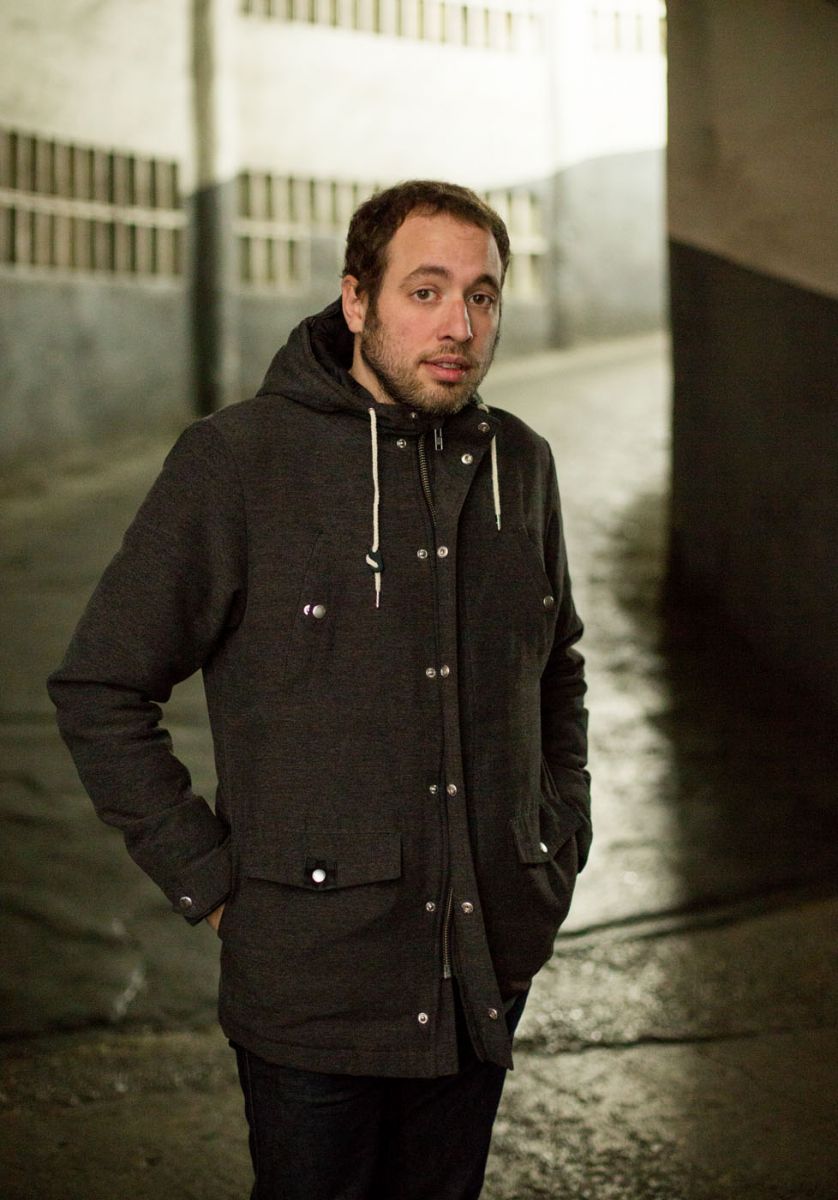
In the end, even if you do not want, and as you say singing the subjective Conditions that the letter of Koldo Izagirre bears, “… however, whoever has heart has a boat to fill a word...”.
Yeah, that's right, but the song came out by chance. I had that melody in my head, that melody that woke me up often. I had the same problem as always: a letter. It's not that I was looking for it precisely, but I often turn to the letters of Koldo, and I went back to that poem and saw that it happened to be OK. I didn't have to adapt anything, and that's what set others in motion.
Does your view of the letters indicate that you're a sound activist and you want music to excel above all?
Yes, clearly. My raw material is sound, it's not the word. In the direct ones I also try to make the music stand out, that the light is scarce, I have also done it in the dark… with this project I do not do it because there is piano in between, but it would be my dream to do it in the dark. And it's not just an aesthetic question, it's nothing to distract music. In addition, with the physicist, with the body I have to play a lot because many times I have to sing with the belly, and it may be too surprising to the listener. I would like to make that point, but it is not always possible.
Would it be the end in absolute darkness and absolute silence?
Yes, tickets would also be cheaper! But, well, for those of us who generate sound, silence is very important. I would prefer to sing without a microphone, because the microphone itself, or the amplification change from song. And the popular song comes from singing on the street or on the mountain, without any kind of fuss.
In recent years a series of musicians have appeared that have united the popular song, experimentation, pop character, be it Mursego, Amorante, Joseba Irazoki… Are you there?
We are friends, of the same generation and, although we come from very different worlds, at one time we met Arto Artian, Arteleku, etc., we met about experimental practices. It may be understandable that with this background it is said that there is a group of these characteristics, but I think that, fortunately, they are very different proposals from each other. Basically, I believe that something that could be called “scene” would be created guided by factors of collaboration and synergy, and not by certain aesthetic or circumstantial characteristics.
Last year, I met a Braham in Delhi. I was surprised that I loved beer and knew it in Spanish. I would say it would be my oldest, but I was walking with the help of a stick, slowly. To see why he knew Spanish, I asked him and he told me that he learned as a child because he heard... [+]
You know how it goes, right? "Dream txuntxurrun green, dream bite...". It is undoubtedly the most famous crib song in Euskera, and also has Vitoria as its protagonist. After a brief study, I learned that Resurrection Mª de Azkue collected in 1922 three versions of the song in his... [+]
Abenduaren 6an agurtu du pilotaren munduak azaroaren 30ean zendutako azkaindarra. Profesional mailan ezker paretan txapela jantzi zuen Ipar Euskal Herriko lehen pilotaria da: bi txapel jantzi zituen binakako txapelketan, Joxan Tolosarekin.
Gasteizko Oihaneder Euskararen Etxearen Batera proiektuen emaitzetarik bat gauzatu du berrikitan Maider Lasak, Malen Iturrirekin elkarlanean. Ekainean aurkeztu zuten Loa, loa, laguna izeneko ikusgarri performatiboa, ahotsez, gorputzez eta irudiz. Tradiziozko lo-kantak oinarri,... [+]
Bost hamarkada baina gehiagoko ibilbidearekin, Oskarbi taldeak badaki zer den egoera zailetan musikaren eta kulturgintzaren haria elikatzea. Ez Dok Amairuren garaietatik gaurdaino, herri kantak eta sormen propioa izan ditu iturri. Hamabigarren diskoa grabatzen ari dira, dozena... [+]
Artzain izan nahi zuen txikitatik, eta artzantzaz bizi da duela hogei urtetik hona. Kantuan aritzea gustuko du eta kantuan ari da etxean bezala plazaz plaza. Ez omen da bizitza idilikoa berea, baina ez omen litzateke beste inon eta beste ezertan zoriontsuago izanen. Urepeleko... [+]









